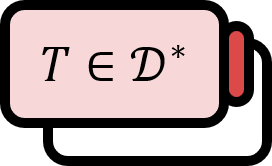Convergence of Distributions
Definition1
Let’s say $D^{\ast}$ is a distribution space, $\left\{ T_{n} \right\}$ a sequence of distributions in $D^{\ast}$. If for all test functions $\phi$, the following equation holds, then $\left\{ T_{n} \right\}$ is said to weakly converge to $T$.
$$ T_{n}(\phi) \to T(\phi) ,\quad \forall \phi \in \mathcal{D} $$
Explanation
The convergence of distributions is referred to as weak convergence because, in the case that $T$, $T_{n}$ are regular distributions, it actually corresponds to weak convergence in a Hilbert space.
Let’s assume $T, T_{n}$ is a regular distribution. Then, there exists a corresponding locally integrable function $u, u_{n}$. In this case, when $T_{n} \to T$, the following holds.
$$ \begin{align*} && T_{n}(\phi) = \int u_{n} (x) \phi (x) dx &\to \int u(x) \phi (x) dx = T(\phi) \\ \implies && \langle u_{n}, \phi \rangle &\to \langle u, \phi \rangle \end{align*} $$
Therefore, the convergence of $T_{n}$ to $T$ means the same as the weak convergence of $u_{n}$ to $u$.
Theorem
If $u, u_{n}$ meets any one of the following three conditions, then $T_{n} \to T$ holds.
(a) $u_{n} \to u$ and for all $n$, there exists $v \in L_{\mathrm{loc}}^{1}$ that satisfies $\left| u_{n} \right| \le v $.
(b) On all bounded sets, $ u_{n}\rightrightarrows u$.
(c) On all bounded sets, $u_{n} \to u \text{ in } L^{2}$.
Gerald B. Folland, Fourier Analysis and Its Applications (1992), p314 ↩︎
